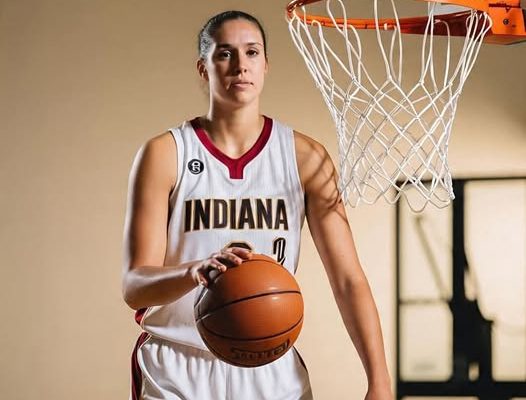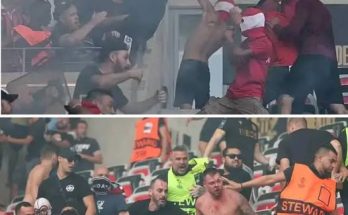The Indiana Fever managed to achieve what many thought would be nearly impossible this season: winning a game without their superstar rookie Caitlin Clark. In a high-stakes matchup that delivered on all fronts, the Fever outlasted the Dallas Wings with a final score of 107-101 in one of the most thrilling contests of the WNBA season. For a team that has been largely defined by the presence of Clark—whose playmaking, scoring, and floor leadership have revitalized not only the Fever but the entire league—this victory proved to be a defining moment in the growth and resilience of Indiana as a team. It was a statement game. Not just because they won, but because they won without the generational player that has carried so much of the weight, media spotlight, and expectations on her shoulders since stepping into the professional ranks.
From the opening tip-off, it was evident that the Fever were going to play differently. The ball movement was sharper. There was no singular gravitational pull around which the offense orbited. Instead, Indiana leaned heavily into team basketball, and for perhaps the first time all season, it worked in a sustained and meaningful way. Kelsey Mitchell stepped up in a major way, leading the team with poise and precision. Her ability to get into the lane, knock down perimeter shots, and facilitate when necessary added a dual threat that Dallas struggled to contain. Without Clark stretching defenses from the logo and commanding constant double-teams, the Fever showed they could execute more conventional sets effectively—if not explosively.
Aliyah Boston, the dominant frontcourt presence from South Carolina who has been trying to find her rhythm alongside Clark all season, seized the opportunity to remind fans and analysts alike why she was the top overall pick in 2023. Boston was everywhere: controlling the glass, setting hard screens, finishing around the rim, and defending with an edge that set the tone for the rest of the team. Her presence in the paint forced the Wings to alter their interior attack, and her ability to find the open shooter when double-teamed showcased a versatility that has often been overshadowed in the Clark-centric narrative of 2025.
NaLyssa Smith also had one of her best games of the season. She was active and engaged from the outset, attacking mismatches and asserting herself in transition. Smith’s energy was infectious, and her mid-range jumper, which has been inconsistent at times, fell with regularity on this night. Her performance was a critical element of Indiana’s success, as it forced the Dallas defense to make tough choices in coverage. Do you collapse on Boston and Smith and risk giving up open threes? Or do you stay home on the perimeter and allow the bigs to go to work inside? In many ways, this was the tactical question Dallas never really figured out how to answer.
The Wings, for their part, were not short on talent or fight. Led by Arike Ogunbowale, who poured in a game-high 31 points, Dallas kept applying pressure throughout the contest. Ogunbowale’s scoring arsenal was on full display—pull-up threes, acrobatic finishes, and late-clock daggers that threatened to swing the momentum at various moments. Yet for every run Dallas made, Indiana responded. The Fever didn’t allow any extended runs to snowball into game-defining shifts. Every time the Wings got within a possession or tied the score, Indiana would answer with a timely basket or defensive stop. That kind of mental toughness had often been absent from this team in previous games, especially when Clark was off the floor. On this night, it was their anchor.
Defensively, the Fever had one of their more disciplined showings. While Ogunbowale got hers, the supporting cast for Dallas was held largely in check relative to expectations. Satou Sabally, still ramping up after returning from injury, struggled to find a rhythm. Her timing looked off on both ends, and she was visibly frustrated by the physicality Boston and Smith brought inside. Natasha Howard, another key contributor for the Wings, had flashes of brilliance but couldn’t string together the kind of consistent play Dallas needed to turn the tide. The Wings committed a number of careless turnovers—many of them unforced—which Indiana converted into points on the other end.
Perhaps most impressive about the Fever’s performance was the way they handled game management in the fourth quarter. Without Clark on the floor to command the ball in clutch time, head coach Christie Sides placed her trust in the trio of Mitchell, Boston, and Smith to close out the game. The Fever executed sets with purpose, taking care of the basketball and forcing Dallas to play defense deep into the shot clock. On one particular possession with under two minutes remaining and Indiana clinging to a three-point lead, Mitchell orchestrated a beautiful high pick-and-roll that culminated in a dump-off to Boston for a smooth finish. The very next trip down, Mitchell pulled up for a cold-blooded three that pushed the lead to six and brought the Gainbridge Fieldhouse crowd to its feet.
The fans in attendance played a critical role in this game. Even without Clark, the arena was near full capacity, which speaks volumes about the investment the city and fanbase have made in the Fever. It also speaks to the new identity this team is building—not just a one-player show, but a legitimate, multi-threat squad capable of making noise in the postseason if it continues to grow and gel. The noise was thunderous during the final minutes, and you could sense how meaningful this moment was for players and fans alike. It was a glimpse of what the post-Clark era might someday look like—or at least, how the team could function when forced to play without its star.
There will undoubtedly be questions about Clark’s absence. Early reports indicated she was dealing with minor soreness and was held out as a precautionary measure. While she remained active on the bench, cheering and coaching up teammates during timeouts, her presence was most noticeable in how the team carried her spirit into battle. They didn’t fold without her. They fought harder. They found another gear. It’s not a slight to Clark—who is still undoubtedly the most important piece of this franchise’s long-term puzzle—but a testament to how much she’s elevated those around her.
And maybe that’s the real takeaway from this game. Not just that the Fever won without Caitlin Clark, but that Clark’s presence—her competitiveness, her unselfishness, her work ethic—has transformed the culture. Players aren’t waiting to be saved by her anymore. They’re learning to save each other. They’re learning to win ugly, to scrap, to close out games with maturity and confidence. Clark has become a galvanizing force, even when she’s not on the floor, and that bodes incredibly well for the Fever as they chase a playoff spot in an increasingly competitive league.
Postgame, the mood in the locker room was one of quiet satisfaction, not over-the-top celebration. Players acknowledged the magnitude of the win but were quick to point out that it was just one game. Mitchell noted that they have “a long way to go,” but that this was a moment to “prove to ourselves we can do it without Caitlin if we have to.” Boston echoed those sentiments, saying the team “needed to see this version of ourselves” and that it “builds a kind of belief that stats don’t always show.”
As for Dallas, this loss stings. It drops them further in the standings and raises questions about their late-game execution and roster cohesion. Ogunbowale continues to be one of the league’s most electrifying scorers, but without more consistent production from the supporting cast, her efforts risk being wasted. The Wings will need to regroup quickly, especially with a tough stretch of games ahead.
For Indiana, though, the narrative is shifting. They’ve been the league’s most scrutinized team thanks to the Clark effect, but now they’ve proven they can win without her. That doesn’t mean they want to. It doesn’t mean they’re better off without her. But it means they are evolving. They are finding ways to win under different circumstances. And for a franchise that has lived through years of losing and irrelevance, this was a night to celebrate something more important than just a single game—it was a night that validated a vision. One that includes Clark, yes, but also stretches beyond her. A vision of a team that believes in itself, fights for each other, and refuses to be defined by any one player—no matter how brilliant.



